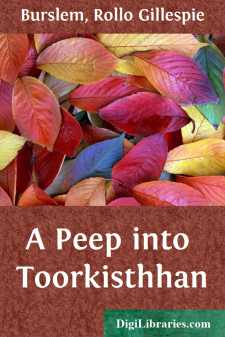Categories
- Antiques & Collectibles 13
- Architecture 36
- Art 48
- Bibles 22
- Biography & Autobiography 813
- Body, Mind & Spirit 142
- Business & Economics 28
- Children's Books 17
- Children's Fiction 14
- Computers 4
- Cooking 94
- Crafts & Hobbies 4
- Drama 346
- Education 46
- Family & Relationships 57
- Fiction 11829
- Games 19
- Gardening 17
- Health & Fitness 34
- History 1377
- House & Home 1
- Humor 147
- Juvenile Fiction 1873
- Juvenile Nonfiction 202
- Language Arts & Disciplines 88
- Law 16
- Literary Collections 686
- Literary Criticism 179
- Mathematics 13
- Medical 41
- Music 40
- Nature 179
- Non-Classifiable 1768
- Performing Arts 7
- Periodicals 1453
- Philosophy 64
- Photography 2
- Poetry 896
- Political Science 203
- Psychology 42
- Reference 154
- Religion 513
- Science 126
- Self-Help 84
- Social Science 81
- Sports & Recreation 34
- Study Aids 3
- Technology & Engineering 59
- Transportation 23
- Travel 463
- True Crime 29
A Peep into Toorkisthhan
Description:
Excerpt
CHAPTER I.
During the summer of 1840, the aspect of the political horizon in AffghanistÐâÐÐn afforded but slight grounds for prognosticating the awful catastrophe which two short years after befel the British arms. Dost Mahommed had not yet given himself up, but was a fugitive, and detained by the King of Bokhara, while many of the principal Sirdars had already tendered their allegiance to Shah Sooja: and there was in truth some foundation for the boast that an Englishman might travel in safety from one end of AffghanistÐâÐÐn to the other. An efficient force of tried soldiers occupied Ghuzni, Cabul, Candahar, Jellalabad, and the other strongholds of the country; our outposts were pushed to the north-west some fifty miles beyond BameeÐâÐÐn, the Khyber and Bolun passes were open, and to the superficial observer all was tranquil. The elements of strife indeed existed, but at the time when I took the ramble which these pages attempt to describe, British power was paramount, and the rumour was already rife of the speedy diminution of the force which supported it.
Notwithstanding the modern rage for exploration, but few of our countrymen have hitherto pierced the stupendous barrier of the Paropamisan range; but the works of Hanway, Forster, Moorcroft, and Trebeck, Masson, and Sir Alexander Burnes, convey most valuable information concerning the wild regions through which they travelled, and I am bound in simple honesty to confess that my little book does not aspire to rank with publications of such standard merit. An author's apology, however humble and sincere, is seldom attended to and more rarely accepted. Surely I am not wrong in assuming that a feeling of mournful interest will pervade the bosom of those who have the patience to follow my perhaps over-minute description of places whose names may be already familiar to them as connected with the career of those bold spirits who in life devoted their energies to the good of their country and the advancement of science, and who in the hour of disaster, when every hope was dead, met their fate with the unflinching gallantry of soldiers and the patient resignation of Christians.
My lamented friend, Lieutenant Sturt, of the Bengal Engineers, was one of the foremost of those who endeavoured, during the critical situation of the Cabul force previous to its annihilation, to rally the drooping spirits of the soldiers; and without wishing in any way to reflect on others, it may fairly be said that his scientific attainments and personal exertions contributed not a little to those partial successes, which to the sanguine seemed for a moment to restore the favourable aspect of our military position. But I forbear from now dwelling upon these circumstances, lest I might undesignedly give pain to those who still survive the fatal event, merely stating my humble opinion that the memory of any mistake committed, either in a political or military light, will by the noble-minded be drowned in sorrow for the sufferings and death of so many thousands of brave men....


